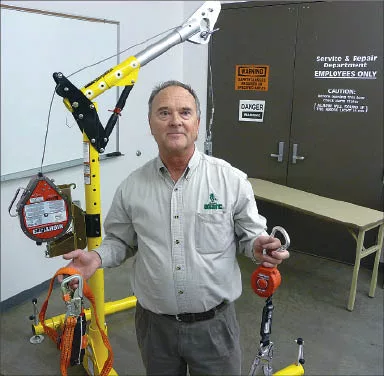
Home » Safety first, even in recession
Safety first, even in recession
Though innovation has slowed, sales are steady for some gear, Spokane vendors say

November 25, 2009
Safety equipment vendors here say product innovations are scarce these days, as manufacturers have pulled in their horns to weather the recession. Meanwhile, sales are generally softer, though there are some bright spots in the safety market.
For instance, sales remain steady for fall-protection gear, such as fall limiters, and for devices used in confined work spaces, such as air-monitoring gear. Also, flame-resistant clothing and what's called arc-flash personal protective equipment, which can protect workers from electric shock, are selling well, as are high-visibility clothing used for roadway work, dealers here say.
Still, Brian Anderson, safety sales manager for Norco Inc., which has a store here at 6102 E. Trent, says, "We're always on the lookout for the latest and greatest new gadget to jump-start sales and give our sales calls more value to the end user." He adds, "I just came back from the national safety expo in Orlando, (Fla.), and only saw a couple of new items, nothing too innovative."
Anderson says, "Everyone is cautious. I am seeing new safety glasses styles from some of the manufacturers. Respiratory protection products are stagnant right now."
Says Mike Standley, sales manager for the safety products division at Oxarc Inc. here, "The economy has reduced the number of new products we've seen compared to a typical year. New is tough to come by."
In the meantime, Standley says, training and retraining with safety equipment can help keep business steady even when there aren't new products.
"There're always people that need training or retraining. We focus continuously on equipment training and regulations and safety practices," he says
Oxarc, which is based in Spokane, has three locations in the Spokane area, at 3417 E. Springfield, 4020 N. Market, and 4003 E. Broadway, as well as one location in Coeur d'Alene, at 3530 Ramsey Road, and a total of 20 branches in Washington, Idaho, and Oregon.
Although the recession has softened sales of some safety equipment, Bill Parrish, account manager at Safety & Supply Co. here, says manufacturing activity has started to pick up some, as have construction projects funded with federal stimulus money, and those are helping to improve sales of some safety items.
Parrish and Anderson both say vendors have seen a decrease in sales of consumables, such as earplugs and safety glasses, because of the economy.
"There simply aren't as many projects happening these days, thus not as many bodies to wear the safety gear," Anderson says.
To cope with the current economy, Anderson says Norco is "forced to take market share and to drive our sales deeper at existing accounts to even come close to maintaining our sales. More sales calls and working longer hours is the key right now. There isn't one single business sector that is hot right now."
Still, he says, flame-resistant clothing and other arc-flash personal protective items are selling well right now, as is high-visibility personal protection equipment for road work. Portable and stationary atmospheric air monitors also are selling well for Norco, he says.
"Every safety catalog and safety magazine you pick up these days features bright orange or lime green apparel," Anderson says.
Meanwhile, Norco is seeing new products from more and more inventors, unemployed people trying as hard as they can to get something started, he says.
Parrish says Safety & Supply, which has a Spokane Valley office at 15310 E. Marietta, has seen increased interest from customers in fall protection items, such as harnesses, lanyards, and self-retracting lifelines. Like other vendors, Safety & Supply has been able to maintain steady sales of air-monitoring equipment, he says.
Vendors here say sales also should be good for disposable filtering facemasks and hand sanitizer because of employers' concerns about flu this winter.
"There's been quite a bit of respiratory interest because of H1N1," Parrish says.
Norco's Anderson says he expects to see gloves, safety glasses, hearing-protection equipment, and other such gear continuing to evolve with newer comfort features and style enhancements. Other than that, he says, anticipating what developers and manufacturers have in their pipelines is difficult to predict.
"That information is held too close to the vest," he says. "The safety business is way too competitive to let that stuff leak out."
Parrish anticipates that manufacturers will continue to improve hand protection with better gloves that are more cut resistant and more dexterous. He looks for increased use of gloves made of Dyneema, a strong polyethylene fiber that is also lightweight.
"I've seen an increased awareness around worker protection in that area, to try and reduce hand injuries," Parrish says.
Companies interested in better gloves include glass companies, those in the sheet-metal industry, and others in which workers are regularly exposed to sharp edges.
"They are looking for something that reduces the cost of injuries, that's the goal," Parrish says.
Latest News
Related Articles

_web.webp?t=1769673727)
_web.webp?t=1769673728)
_web.webp?t=1769673735)
